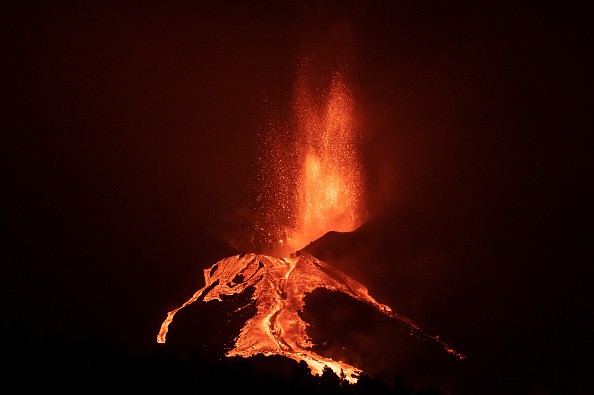
On Wednesday after three-and-a-half weeks of volcanic activity, experts said there is no chance that the volcanic eruption in Spain's Canary Islands will come to an end any time soon.

La Palma Volcano
A spokesman for the Canaries' volcanologist group Pevolca, Maria Jose Blanco said at the Cumbre Vieja volcano which is on La Palma island, "levels of sulphur dioxide don't currently lead us to think the end of the eruption will be in the short or medium term."
Other experts have said the eruption could possibly last for weeks or perhaps months.
The eruption began on the19th of September and for La Palma which is an island harboring about 85,000 people, the recent eruption is the third in a century, after San Juan in 1949 and Teneguia in 1971.
On Wednesday, during Prime Minister Pedro Sanchez fourth visit to the island since the eruption began, he said, "The volcano's activity is not stopping and it doesn't seem that we can expect to observe a reduction in the coming days."
Also Read : Experts Debunked Fears of Mega-Tsunami Coming to East Coast Due to La Palma Volcanic Eruption
Impacts of the Eruption
So far the continuous lava flows haven't killed anyone, but the molten rock has blanketed around 1,600 acres (640 hectares), destroying 1,400 buildings. Of the 1,400 affected buildings, 764 are homes, said Miguel Angel Morcuende, Pevolca technical director.
Over 6,000 people have been relocated, abandoning all their properties to the lava.
Currently, aircraft are reaching La Palma's airport, which the eruption prompted its closure two times because of the volcanic ash. Weather forecasts reveal it can remain open for the next four days.
There are many reasons for the eruption of a volcano. It is an unstable state of matter in which pressure leads to instability, which leads to further pressures. This process repeats until the whole structure collapses under its own weight.
An eruption is caused by several factors, but one of the main ones that play a role in triggering it is magma that has accumulated at very low temperatures and pressure near the surface of the earth.
Volcanic Event
In order to understand the effects of a volcanic eruption, scientists have to get a better understanding of the eruption itself. Today's volcanic events are not simple explosions - they are complex and involve many different factors.
Volcanic eruptions occur on a regular basis and can cause disastrous consequences. It is known that volcanoes are caused by magma moving upwards through the earth's crust.
A volcanic eruption is an example of a big event that happens in a short span of time. A volcano in a different location gets hot and emits gases that push through the crust, forming new crusts and creating new magma chambers that have opened up to create new volcanoes.
The effects of volcanic eruptions depend on different factors such as height above sea level, distance from sea level to the centre point, the rate at which the magma is being created from minerals in the ground.
Related Article : La Palma Volcanic Eruption Persists With Its Resulting Effects Felt From Above and Below
For more news, updates about volcanic eruption and similar topics don't forget to follow Nature World News!
© 2025 NatureWorldNews.com All rights reserved. Do not reproduce without permission.





